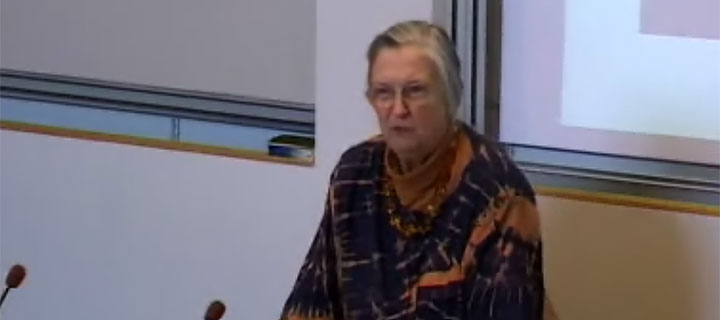Elinor Ostrom's Research on Management of Common Resources
You can get an overview of Elinor Ostrom's work on "self-organizing and self-governing forms of collective action" in an interview (pdf) she gave Paul Aligica in 2003.
(Stockholm Resilience Centre)
Ostrom, a political science professor at Indiana University, shared this year's Sveriges Riksbank Prize in Economic Sciences in Memory of Alfred Nobel with Oliver E. Williamson, an economist at the University of California-Berkeley (and the subject of tomorrow's post).
In the interview, Ostrom explains the gist of her thinking:
Academics, aid donors, international nongovernmental organizations, central governments, and local citizens need to learn and relearn that no government can develop the full array of knowledge, institutions and social capital needed to govern development efficiently and sustainably. The sheer variety of cultural and biological adaptations to diverse ecological conditions is so great that I am willing to make the following assertion: Any single, comprehensive set of formal laws intended to govern a large expanse of territory containing diverse ecological niches is bound to fail in many of the areas where it is applied.Ostrom emphasizes the importance of viewing self-organized groups as complex adaptive systems and of recognizing the value of polycentric governance.
Improving the abilities of those directly engaged in the particulars of their local conditions to organize themselves in deeply nested enterprises is potentially a more successful strategy for solving resource problems than attempting to implement idealized, theoretically optimal institutional arrangements. There is plenty that national government officials can do to help a self-governing society. They can provide efficient, fair, and honest court systems, effective property right systems and large-scale infrastructure projects — such as national highways — that cannot be provided locally.
Complex adaptive systems are composed of a large number of active elements whose rich patterns of interaction produce emergent properties that are not easy to predict by analyzing the separate parts of a system. One can see them as consisting of rules and interacting agents that adapt by changing the rules dynamically on the basis of experience. ... [S]ocial scientists have yet to develop many of the concepts needed to understand the adaptability of systems. ...Another, more recent overview of Ostrom's work is provided in the video below, which records the 8½-minute talk she gave earlier this year at the Stockholm Resilience Centre.
Many of the capabilities of complex adaptive systems are retained in a polycentric public enterprise system. By "polycentric" I mean a system where citizens are able to organize not just one but multiple governing authorities, as well as private arrangements, at different scales. Each unit may exercise considerable independence to make and enforce rules within a circumscribed scope of authority for a specified geographical area. ... Self-organized resource governance systems, in such a system, may be special districts, private associations, or parts of a local government.
...
Serious empirical research has now shown that polycentric systems tend to generate higher levels of output at similar or lower costs than monocentric systems governing similar ecological, urban, and social systems.
(Background information on Ostrom's Stockholm talk is here.)
Labels: Collaboration, Decision-making, Learning organization, Notables, Productivity, Systems thinking
<< Home